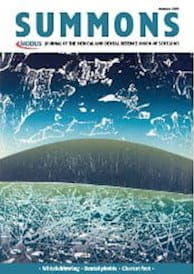IN THE EARLY 1950s, as a student at the University of Glasgow medical school, I attended a series of lectures on materia medica. I recall waiting along with other students for our new lecturer, Dr Isaacs, not knowing quite what to expect. We were told he came from the famed department of Regius Professor Stanley Alstead. Dr Isaacs arrived smiling, business-like, and proceeded to galvanise and mesmerise us with his erudition, humour and insight. It was like watching GB Shaw, Chic Murray and ‘Brains Trust’ Professor CEM Joad somehow speaking in unison. That lecture has stayed with me for over half a century of practice.
Bernard Isaacs made his mark as one of the great innovators of British geriatric medicine. Not for him the laissezfaire notion that therapy for the sick senior may not prove worthwhile “because he is too old” or “the sickness is chronic” or “because it has not been tried before”. Practising at Foresthall and like institutions of the day, he recognised that multiple illness of the senior years needed a broader perspective in socio-economic and medical terms.
A native Glaswegian, Isaacs attended Kilmarnock Academy and his prowess all the way to Dux of that notable institution was a fitting background to his career in medicine. He earned his MB ChB in 1947 at the University of Glasgow and an MD in 1957. In subsequent years he worked as assistant and then consultant physician at Foresthall Hospital before moving to Glasgow Royal Infirmary as Consulting Physician in Geriatric Medicine in 1964.
In 1975, Isaacs was appointed to the new Charles Heywood Chair in Geriatric Medicine at Birmingham University. Here was an ideal setting, from the mid-1970s onwards, to develop his progressive and original views on teaching and research in geriatric medicine, not to mention launching a gerontology certificate at the university.
Those of us who met up personally with Isaacs, through the 1960s to 80s in Glasgow, Birmingham or London, were enthused by his sharpness, drive and originality. When I was awaiting publication of my own book on hospital geriatric medicine in the late 1960s, I met up with Isaacs who also had a book coming out. My work was called, matter-offactly, Later Life. As always, Isaacs came up trumps. His catchy title was Survival of the Unfittest – a searing analytical account of the socio-medical tribulations suffered by Glasgow’s east-end elderly leading to referral to geriatric wards.
From this and other studies, Isaacs famously coined the expression the “geriatric giants” or the four I’s: impairment of intellect (cerebral dysfunction), incontinence, immobility and instability (falls). The term ‘giant’ is seen to refer both to statistical frequency and to the huge personal burden of sufferers, escalating the need for socio-medical intervention.
A compassionate, clear-thinking academic, Isaacs was practical and logical. Long before role-playing and role-reversal techniques became part of health profession training, he adapted these formats to teach and to research. He believed that only by self-simulating serious affliction illness, for at least 24 hours, can anyone begin to appreciate the catastrophic effect on any individual.
Notwithstanding his successful years in ‘Brummy-land’, Isaacs expressed pride in his Scottish education and Scottish medical training. He was, like the author of this tribute, influenced towards elderly medicine in Glasgow by the charismatic geriatrician, Professor Sir William Ferguson Anderson. Isaacs’ humour could be literary, ironic or ‘Glasgow dry’. Kindly attending one of this writer’s medical talks in late 1970s Birmingham on the topic ‘ageing and sexual dysfunction’, Professor Isaacs afterwards asked me with a gentle grin: “are you the only geriatrician in England making a living at this?”
The aphorism ‘behind every successful man….’ was affirmed by happy marriage to Dorothy Berman of Glasgow and they had four sons. Isaacs relished his religious faith wherever he lived and this no doubt influenced his post-retirement move to Jerusalem in 1992. Here for a time he was linked with the former Brookdale Institute of Gerontology.
As a pioneering Professor at Birmingham, Isaacs looked not just within the establishment for positive solutions to the problems of the elderly infirm but he also encouraged a hands-on/feet-on approach to products used daily by and for old people, seeking their opinions directly and arranging to pass on consumer views appropriately: effectively an applied gerontology centre.
Even when officially retired in Israel, he still pondered furniture for the infirm, for example how to rise comfortably from a chair.
His last major publication in 1992, Challenge of Geriatric Medicine, impressed readers by its breadth and erudition. It readily confirmed that his 1989 CBE had been a well-justified honour. The volume remains a fitting reminder of a super-star of geriatric medicine, who, sadly for him, his family and world-wide admirers, was not to be blessed with very old age.
Bernard Isaacs is recalled not just for his giant four I’s. We also miss deeply his personal three W’s – wit, warmth and wisdom.
This page was correct at the time of publication. Any guidance is intended as general guidance for members only. If you are a member and need specific advice relating to your own circumstances, please contact one of our advisers.
Read more from this issue of Insight

Save this article
Save this article to a list of favourite articles which members can access in their account.
Save to library